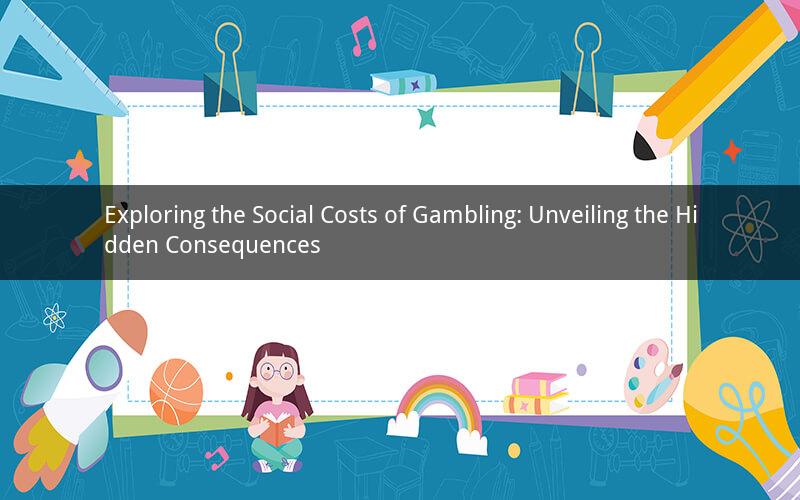
Gambling, an age-old pastime that has gained immense popularity in recent years, has both its enthusiasts and detractors. While many individuals engage in gambling for entertainment and as a way to escape reality, it is crucial to recognize the social costs associated with this activity. In this article, we will delve into the various social costs of gambling, shedding light on the hidden consequences that affect individuals, families, and society as a whole.
1. Financial Ruin
One of the most significant social costs of gambling is the potential for financial ruin. Many individuals, driven by the allure of winning big, end up spending far beyond their means. This can lead to severe financial stress, debt, and even bankruptcy. As a result, the social costs extend beyond the individual to their families and communities. Families may face financial instability, loss of homes, and even the burden of supporting loved ones who have become financially dependent on gambling.
2. Mental Health Issues
Gambling can also have a profound impact on mental health. Individuals who engage in excessive gambling may develop gambling-related disorders, such as pathological gambling or gambling addiction. These disorders can lead to a range of mental health issues, including depression, anxiety, and even suicidal thoughts. The social costs of gambling-related mental health problems are immense, as they not only affect the individuals themselves but also their families, friends, and society at large.
3. Family Breakdown
Gambling can strain relationships and lead to family breakdown. When a family member becomes excessively involved in gambling, it can create a sense of neglect, anger, and resentment among other family members. This can lead to conflicts, arguments, and even separation. The social costs of family breakdown are far-reaching, affecting children, parents, and extended family members. Children may experience emotional and psychological trauma, while parents may struggle with guilt and regret.
4. Crime and Social Disorder
Gambling can also contribute to crime and social disorder. The illegal activities associated with gambling, such as money laundering and organized crime, can have devastating consequences for communities. Additionally, gambling addiction can lead individuals to engage in criminal behavior, such as theft or fraud, in order to fund their gambling habits. The social costs of crime and social disorder are immense, including increased law enforcement costs, decreased public safety, and a decline in community cohesion.
5. Lost Productivity
The social costs of gambling also extend to lost productivity. Individuals who are consumed by gambling may neglect their responsibilities at work, school, or home. This can lead to decreased job performance, lower academic achievement, and a decline in overall productivity. The social costs of lost productivity are significant, as they affect the individual's quality of life, their contribution to society, and the economic well-being of their community.
Frequently Asked Questions:
Q1: How can gambling addiction be identified?
A1: Gambling addiction can be identified through various signs and symptoms, such as preoccupation with gambling, increased gambling frequency, loss of control over gambling, and experiencing negative consequences as a result of gambling.
Q2: Can gambling addiction be treated?
A2: Yes, gambling addiction can be treated through various methods, including therapy, counseling, support groups, and in some cases, medication. Treatment is tailored to the individual's specific needs and may involve a combination of approaches.
Q3: How does gambling addiction affect children and adolescents?
A3: Gambling addiction can have a significant impact on children and adolescents, including emotional, psychological, and financial consequences. Children may experience trauma, anxiety, and a sense of neglect, while adolescents may struggle with academic performance and social relationships.
Q4: What role does society play in addressing the social costs of gambling?
A4: Society plays a crucial role in addressing the social costs of gambling through education, awareness campaigns, and policy-making. By promoting responsible gambling, providing support for those affected by gambling addiction, and implementing strict regulations, society can help mitigate the negative impacts of gambling.
Q5: Can governments effectively regulate gambling to minimize its social costs?
A5: Governments can effectively regulate gambling to minimize its social costs by implementing strict licensing requirements, age restrictions, and advertising regulations. Additionally, governments can invest in research, education, and treatment programs to support individuals affected by gambling addiction and reduce the overall social burden.